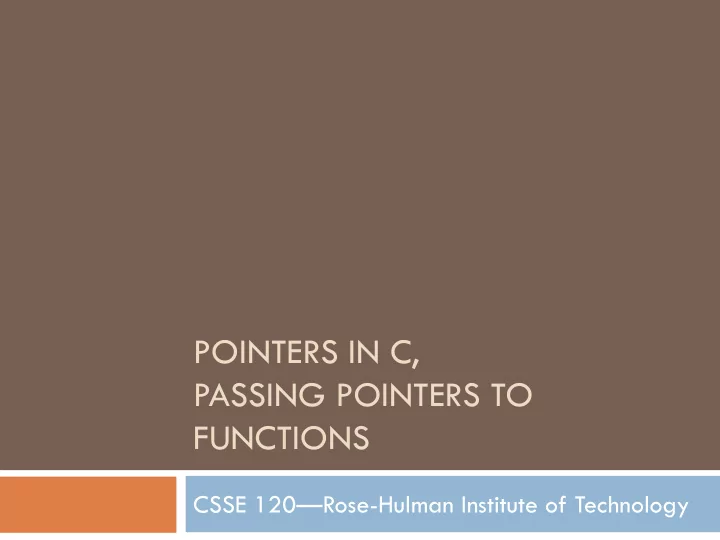

POINTERS IN C, PASSING POINTERS TO FUNCTIONS CSSE 120—Rose-Hulman Institute of Technology
Parameter Passing in Python � In Python, parameters are passed two ways: � For numbers, a copy of the number is passed to the function � For mutable objects (like lists), a reference to the object is passed to the function def swapListElements (alist, i, j): def swapInts (x, y) : 2 x,y = y,x 5 alist[i], alist[j] = alist[j], alist[i] x y x,y = 2, 5 aList 2 5 alist = [3, 4, 5, 6] 3 4 5 6 swapInts (x, y) swapListElements(alist, 1, 3)
References in C � In C, you can obtain a reference to any variable. � These references are called pointers . � By “reference”, we mean the address or memory location of the variable. � If we pass a variable’s address as a parameter to a function, the function can change the value of that variable. � Overview: � To get an address, use & � To get a variable referenced by a pointer, use * � To declare a pointer variable, use * Q1
Visualizing Pointers Box and Pointer Diagrams int num = 4; Use the * in a declaration to indicate that a int *pNum; variable is a pointer. pNum = # Use the & in an expression to get the address of a variable. pNum: num: ??? 4 memory: How do we obtain the value to which pNum refers (a.k.a. the “pointee”)?
Visualizing Pointers – Part 2 int num = 4; int *pNum; pNum = # double change = 0.45 ; double *pChange = &change; We can declare and initialize a pointer in a single statement. Use the * in an expression to get the value *pChange = .62; referenced by a pointer. pNum: pChange: num: change: ??? 4 //// 0.62 0.45 . . . memory:
Summary of Pointers � Example of a pointer variable: int *pNum; � Example of a integer variable: int num; � Assigning a value to an int: num = 4; � Obtaining the address of a variable: &num � Assigning an address to a pointer variable: pNum = # � Assigning a value to the variable to which a pointer variable points: *pNum = 7; Q2-5
Here’s Binky! � Ignore malloc for now � Vocabulary � Pointee: the thing referenced by a pointer � Dereference: obtain the pointee � See http://cslibrary.stanford.edu/104/ � What name did we give pointer “sharing” in Python?
Proof that pointers store memory locations � Checkout the PointersInClass project. � Run it in the debugger � The console is a separate window � It automatically inserts a breakpoint at the start of main() � Let’s start quiz questions 6-8 together Q6-8
Using pointers with functions � We claimed earlier that if we passed a variable’s reference as a parameter to a function, the function could change that variable. � Reminder: � To get an address, use & � To get a variable referenced by a pointer, use * � To declare a pointer variable, use *
An example together � In Eclipse, run downAndUp � Change the function and how it’s called so that it works! � When you are done, please answer the quiz question. Q9
A simple example for reference � void foo(int *a){ *a = 7; Receive an address printf("%d\n", *a); } Modify value at address int b = 3; Send the address of b foo(&b); printf("%d\n", b);
Practice with Pointers int x = 3, y = 5; 1. 2. int *px = &x; 3. int *py = &y; 4. printf("%d %d\n", x, y); 5. *px = 10; 6. printf("%d %d\n", x, y); /* x is changed */ 7. px = py; 8. printf("%d %d\n", x, y); /* x not changed */ 9. *px = 12; 10. printf("%d %d\n", x, y); /* y is changed */
Pointer Pitfalls � Don't try to dereference an unassigned pointer: � int *p; *p = 5; � /* immediate crash! */ � Pointer variables must be assigned address values. � int x = 3; int *p; p = x; � /* eventual crash */ � Be careful how you increment � *p += 1; /* is not the same as … */ � *p++;
In-class exercise on pointer pitfalls � Turn in part 1 of the quiz. � The rest of today’s quiz lets you see some pointer pitfalls in action. These make great exam questions! � Do it now � When you are done, start the homework: � A written portion (box and pointer diagrams) � More pointer output � Writing functions to change variables � doubleMe � swap � scanf revisited Part 2 Q1 - 4
Recommend
More recommend